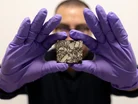Google: Revolutionising Roads with AI & Self-Healing Asphalt

Potholes: universally despised, these nuisances compromise road safety and vehicle integrity worldwide.
Even the most durable roads succumb to potholes, from those battered by monsoon rains in Asia to those that endure harsh freeze-thaw cycles elsewhere.
In terms of road quality, the UK ranks the lowest in Europe, with costs soaring to £143.5m (US$176.1m) annually.
What exacerbates these costs is the need for asphalt — a significant source of carbon emissions and other pollutants like nitrogen oxides, carbon monoxide and particulate matter during production.
So imagine a world where roads mend themselves?
This is not as far-fetched as it sounds, thanks to groundbreaking research involving King’s College London, Swansea University and collaborators in Chile.
With the help of Google Cloud AI tools, these scientists are pioneering a future of self-repairing roads.
"In our interdisciplinary study, we are bringing together experts in civil engineering, chemistry and computer science to investigate the self-healing properties of a modified bitumen," explains Dr Jose Norambuena-Contreras, an expert in Self-Healing Asphalt at Swansea University.
“By combining this knowledge with the state-of-the-art AI tools of Google Cloud, we aimed to enhance our understanding of bitumen’s healing capabilities through a bottom-up molecular design approach.
“We are proud to be advancing the development of self-healing asphalt using biomass waste and artificial intelligence. This approach positions our research at the forefront of sustainable infrastructure innovation, contributing to the development of net zero roads with enhanced durability."
The mystery of potholes
Asphalt, a semi-solid form derived from petroleum, consists of aggregates and bitumen — a sticky, black byproduct rich in carbon, hydrogen and sulphur.
Over time, exposure to oxygen hardens bitumen, leading to cracks that develop into potholes when water invades and freezes.
Reversing this natural degradation process, researchers have devised techniques to stitch road surfaces back together inherently.
When bitumen shows cracks, this new type of asphalt begins its self-repair.
The innovative material includes tiny, porous spores smaller than a human hair, derived from plant materials.
These spores are laden with recycled oils which seep out to mend the cracks as they form.
In controlled lab conditions, this novel asphalt healed surface microcracks in under an hour, negating the need for traditional pothole-filling techniques and reducing asphalt production demands alongside its associated emissions.
AI helping with potholes
Using machine learning, the team analyses organic molecules in complex fluids like bitumen.
Their data-driven model helps accelerate atomistic simulations, where the behaviour of materials is modelled by simulating interactions between atoms.
This is part of a collaboration with Google Cloud, which assists in simulating bitumen behaviour on superior computing platforms.
Dr Francisco Martin-Martinez, an expert in Computational Chemistry at King’s College London, says: “In our research, we want to mimic the healing properties observed in nature. For example, when a tree or animal is cut, their wounds naturally heal over time, using their own biology.
“Creating asphalt that can heal itself will increase the durability of roads and reduce the need for people to fill in potholes.
“We are also using sustainable materials in our new asphalt, including biomass waste. This will reduce our dependence on petroleum and natural resources.
“Biomass waste is available locally and everywhere, and it is cheap. Producing infrastructure materials from local resources like waste reduces the dependence on petroleum availability, which helps those areas of the world that have limited access to petroleum-based asphalt.”To create self-healing roads, researchers used tiny plant-based spores filled with recycled oils.
Though still in development, this innovation could reduce asphalt production and emissions by preventing potholes before they require filling.
Iain Burgess, UKI Public Sector Leader at Google Cloud, says: “We first worked with Dr Francisco Martin-Martinez when he joined the Google Cloud Research Innovators Programme in 2022, providing him access to Google experts, technical resources and training to support his research.
“Now, it is inspiring to see how teams at Swansea and King’s College London are unlocking the power of cloud-based and AI tools, including Gemini and Vertex AI, to drive more efficient processes and discover chemical properties.”
Make sure you check out the latest industry news and insights at ClimateTech Digital and be part of the conversation at our global conference series, Sustainability LIVE.
Discover all our upcoming events and secure your tickets today. Subscribe to the ClimateTech Digital newsletter.
ClimateTech Digital is a BizClik brand


